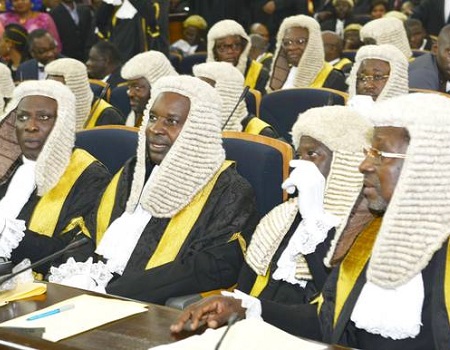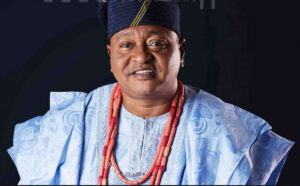Body of SANs calls for establishment of constitutional court to handle political cases
[ad_1]
Worried by the several adjournments cases suffer in court as a result of political cases, the Body of Senior Advocates of Nigeria (BOSAN) has called for the establishment of a national constitutional court of Nigeria.
BOSAN made the call on Monday in a message through Chief Adegboyega Awomolo (SAN) to the special court session to mark the 2022/2023 Legal Year of the Federal High Court in Abuja.
The body said the constitutional court, if established, will handle all constitutional, political, and election matters, adding that, “It will be a Federal High Court, of the status of High Court with divisions in all states of the Federation and the Federal Capital Territory.
BOSAN said the constitutional court will have unlimited jurisdiction to determine all cases relating to or connected with the interpretation of the constitution, enforcement of fundamental rights of the citizens, determination as to whether any person has been lawfully elected into any office from the President to the State governors and members of all the legislative houses.
It explained further that the court will be like the National Industrial Court of Nigeria that exercises jurisdiction on matters rated to employment and other industrial-related matters.
“All the decisions of the court will be appealable to the Court of Appeal and all appeals ends at the Court of Appeal. There no longer be the need to take away about 500 Judges from their normal court responsibilities to sit on election tribunals all over the country. We have enough human resources to serve the court in all capacity”.
While calling on the parliament and stakeholders in the justice delivery of the country to think in this direction, Awomolo said, the cost of establishing and maintaining the court wi be equal to the sum being wasted on provisions of logistics, convenience, and security for judges, hundreds of support staff who are made to transverse the length and breadth of the country to adjudicate on political and election cases.
BOSAN said since June this year when the Independent National Electoral Commission (INEC) opened the gate to activate political activities towards the general elections scheduled for February and March next year, the Federal High court has been under very severe pressure and the judges, the entire administrative and court registrar’s have been extremely stretched
It said, in the last six months that most courts are engaged in attending to political cases, the primary and statutory causes of the courts under section 251 (1)-(4) of the constitution have suffered inevitable delay.
According to Awomolo, the founding fathers of the country’s democracy and those who fashioned the specialized and exclusive jurisdiction for the court did not envisage the aberration of cases on political disputations arising from lack of internal democracy, political shenanigans, and impunity in the management of political parties, as one that will interrupt the court from doing its constitutional duty.
“Normal cases inevitably had to suffer adjournments thereby frustrating good and urgent causes, adding that, 2022/2023 legal year will, perhaps be another one that has thrown up challenges in the country’s constitutional democratic struggle for all Nigerians.
In his speech, the Chief Judge of the Federal High Court, Justice John Tsoho said he will provide innovative methods of improving the administration of justice, in line with the primary responsibility of the Court, which is to provide access to Justice as far as possible.
Tsoho who said that the welfare of judges and staff remains his major priority said it is disheartening that the disposition has been continually hampered by financial squeeze, adding that, the budget of the court this year makes it almost impracticable to effectively achieve its normal running.
Justice Tsoho said, there was an additional jurisdiction that was conferred on the court, with the signing into law of the Electoral (Amendment) Act, 2022 by President Muhammadu Buhari after it was passed by the National Assembly.
By virtue of sections 29(5) and (84(14) of the Act, he said, exclusive jurisdiction is foisted on the Federal High court in the hearing and determination of pre-election complaints, adding that such pre-election cases must be concluded within 180 days.
He said the 2020/2021 legal year officially closed in July 2021 with 132, 821 cases pending at the end of that legal year and carried over to the 2021/2022 legal year.
Within that legal year, he said a total of 17677 cases were filed, while the total number of cases disposed of was 13, 906, “When this is added to the total number of cases from the previous year, which is 131,821, we have a total of 135,592 cases pending at the end of the legal year.
“This comprises of 41,788 civil cases, 31, 832 criminal cases, 39,799 motions, and 22,173 fundamental rights enforcement applications pending at the end of the legal year,” he said and made case for the appointment of nine more Judges for the court in the interest of litigating public and the general society.
The Attorney General of the Federation (AGF) and Minister of Justice, Abubakar Malami (SAN) in his speech, commended the giant strides being taken by the leadership of the Federal High Court with regard to pertinent contributions to the administration of justice in Nigeria, as well as investing in capacity building and exchange of ideas with distinguished Judges.
He expressed the hope that the initiatives will facilitate the dispensation of justice to litigants before the Court.
He said, ”Going by the salient provisions of Section 251(1) (a) – (s), (2) and (3) of the Constitution of the Federal Republic of Nigeria 1999 (as amended) and other enabling statutes, the Federal High Court occupies a very fundamental place in our judicial architecture since its establishment 49 years ago. The foregoing constitutional provisions confer jurisdiction on the Federal High Court to adjudicate on matters on the Exclusive Legislative List. Thus, the Federal High Court is quite vital to all aspects of governance at the Federal level and beyond; and places the court at the heart of the administration of both civil and criminal justice in Nigeria.
The Federal High Court, he said is always the first port of call in subjecting executive or administrative decisions, policies, and programmes of the Federal Government to legal tests.
He commended the Chief Judge and learned justices for their efforts in supporting several ongoing cases of corruption and the mass trial of Boko haram suspects in dedicated military facilities.
He urged the judges of the court to advance the course of the nation’s electoral jurisprudence and strengthen democratic practices, especially in entrenching internal party democracy.
“While this is evidently taking a toll on the court, it is, however, gratifying to note that the leadership of the court has shown commitment and determination to manage the situation optimally through the issuance of the Federal High Court Pre-Election Practice Directions 2022 and the constitution of a special task force of Judges to speedily hear and determine all Pre-Election matters before the Federal High Court”.
ALSO READ FROM NIGERIAN TRIBUNE
[ad_2]















Post Comment